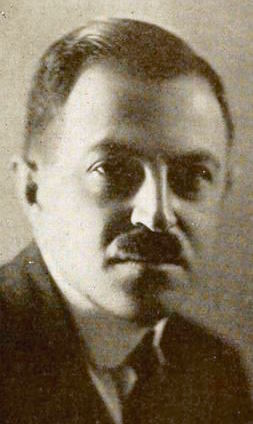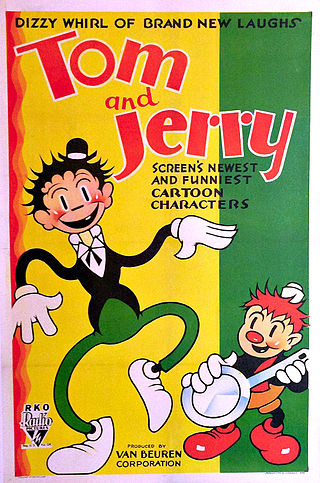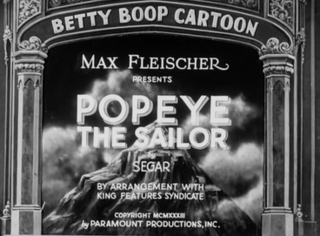
Snow-White is a 1933 American animated short in the Betty Boop series from Max Fleischer's Fleischer Studios. Dave Fleischer was credited as director, although virtually all the animation was done by Roland Crandall, who received the opportunity to make Snow-White on his own as a reward for his several years of devotion to the Fleischer studio. The resulting film, which took six months to complete, is considered both Crandall's masterwork and an important milestone of the Golden age of American animation.

Fleischer Studios was an American animation studio founded in 1929 by brothers Max and Dave Fleischer, who ran the pioneering company from its inception until its acquisition by Paramount Pictures, the parent company and the distributor of its films. In its prime, Fleischer Studios was a premier producer of animated cartoons for theaters, with Walt Disney Productions being its chief competitor in the 1930s.

Max Fleischer was a Polish-American animator and studio owner. Born in Kraków, in Austrian Poland, Fleischer immigrated to the United States where he became a pioneer in the development of the animated cartoon and served as the head of Fleischer Studios, which he co-founded with his younger brother Dave. He brought such comic characters as Koko the Clown, Betty Boop, Popeye, and Superman to the movie screen, and was responsible for several technological innovations, including the rotoscope, the "follow the bouncing ball" technique pioneered in the Ko-Ko Song Car-Tunes films, and the "stereoptical process". Film director Richard Fleischer was his son.

Betty Boop is an animated cartoon character designed by Grim Natwick at the request of Max Fleischer. She originally appeared in the Talkartoon and Betty Boop film series, which were produced by Fleischer Studios and released by Paramount Pictures. She was featured in 90 theatrical cartoons between 1930 and 1939. She has also been featured in comic strips and mass merchandising.
Myron Waldman was an American animator, best known for his work at Fleischer Studios.

Tom and Jerry are fictional characters that starred in a series of early sound cartoons produced by the Van Beuren Studios, and distributed by RKO Pictures. The series lasted from 1931 to 1933.

Mae Questel was an American actress. She was best known for providing the voices for the animated characters Betty Boop and Olive Oyl.

Myron "Grim" Natwick was an American artist, animator, and film director. Natwick is best known for drawing the Fleischer Studios' most popular character, Betty Boop.

The Little King is an American gag-a-day comic strip created by Otto Soglow, which ran from 1930 to 1975. Its stories are told in a style using images and very few words, as in pantomime.

The Old Man of the Mountain is a 1933 American pre-Code live-action/animated short in the Betty Boop series, produced by Fleischer Studios. Featuring music by Cab Calloway and his Orchestra, the short was originally released to theaters on August 4, 1933, by Paramount Pictures. Calloway voices all of the characters in the cartoon save for Betty herself. Calloway and his orchestra also perform all of the music in the cartoon, including two songs Calloway co-wrote.

Popeye the Sailor is a 1933 animated short produced by Fleischer Studios and distributed by Paramount Publix Corporation. While billed as a Betty Boop cartoon, it was produced as a vehicle for Popeye in his debut animated appearance.
Out of the Inkwell is a 1938 Max Fleischer/Betty Boop live-action and animated short film. The title and concept for the film were a tribute to the Out of the Inkwell series of films that Max Fleischer had produced during the 1920s.
Barnacle Bill is a 1930 Fleischer Studios animated short film. It is part of the Talkartoons series, and featured Betty Boop and Bimbo.
A Little Soap and Water is a 1935 Fleischer Studios animated short film starring Betty Boop.
Betty Boop with Henry, the Funniest Living American is a 1935 Fleischer Studios animated short film starring Betty Boop, and featuring Carl Anderson's Henry. The short was also released as Betty Boop with Henry.
More Pep is a 1936 Fleischer Studios animated short film starring Betty Boop, and featuring Pudgy the Puppy.
Betty Boop and Little Jimmy is a 1936 Fleischer Studio animated short film, starring Betty Boop and featuring newspaper comic strip character Little Jimmy.

Professor Grampy is an animated cartoon character appearing in the Betty Boop series of shorts produced by Max Fleischer and released by Paramount Pictures. He appeared in nine of the later Betty Boop cartoons beginning with Betty Boop and Grampy (1935). He had a starring role in the "Color Classic" Christmas Comes But Once a Year (1936).
Mask-A-Raid is a 1932 Fleischer Studios Talkartoon animated short film starring Betty Boop. It is the first Betty Boop cartoon to show Betty as a human.

Lillian Friedman Astor was an American animator who was one of the first female animators in the country. She worked for Fleischer Brothers' studio, inking and eventually animating various Betty Boop cartoons, as well as one Popeye, some Color Classics, and several Hunky and Spunky cartoons, although she received screen credit on only six of the forty-two cartoons she animated in her lifetime.












